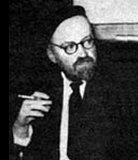Dichter
León de Greiff

León de Greiff
(Colombia, 1895)
Biografie
León de Greiff was born in Medellín, Colombia, in 1895. A founder of the influential poetry review Panida, he also started the literary group ‘Los Nuevos’, and edited the Revista de las Indias. He wrote under numerous different names, amongst which Gaspar von der Nacht, Leo le Gris, Guillaume de Lorges and Sergio Stepansky. Later in life he became the Colombian consul in Sweden, the country of his ancestors. He died at the age of eighty-one.
They decided to call themselves so in homage to the god Pan, in Greek mythology a son of Hermes, the messenger of Olympus, and of the nymph Dryope. Pan used to join Bacchus, the god of wine, in his walks through mounts and valleys, both hunting, and Pan accompanying the dances of the nymphs with a rustic flute created by himself. So in the name of the review itself is manifested the Dionysiac character of de Greiff’s poetry, built upon new melodies, new rhythmic forms, and self-invented words that were deliberately anachronistic but linked to a very particular vanguard, that mixed the Baroque heritage of the Spanish Golden Age with the new findings of Modernism. In one of his poems, León de Greiff described thus his friends of adventure:
Musicians, rhapsodes, prose writers,
poets, poets, poets,
caricaturist painters,
petty scholars, aesthetes,
romantics or classicists
or pedantic – if that’s your view –
but anyway crazy and artists:
we, the Panidas, were thirteen.
They appear with a spirit of total renewal, with an air of poets marked by the influence of the French poètes maudits, that they read with so much passion. In all the poetry of Leo le Gris (as he signed with one of his many pen names) there are constant references to those poets. The appearance of his poems coincided with the moment in which a great change in literary forms was beginning to take place in the country. De Greiff personified this renewal from the start, and was something like an unmistakable sign of this new school. He was then forced to resist the atttacks of the traditionalist criticism that considered him a mere ‘snob’ of thinking, only because his poetic style did not conform to the prevalent manners of expression.
His poetry was characterized from the start by a certain transcendental irony, whose effect was felt in sentimental affectation. But sometimes he interrogated the stars and his voice blended with the anguish of the spirit. “All is worth nothing if the rest is worth less”, he said with a formula of terrifying nihilism. But in his spirit there was a great sensitive dimension, beyond his irony and his reiterated ennui: “all ennui I store in my wineskins”, as he expresses it in one of his poems.
His poetry is full of contrast and transitions, indicating a humorous sense of life: a dramatic action suddenly divides itself and lets the comic torrent flow on; an intimate confession arises from pain to become a mental formula of geometric hardness. This, one of formulas that shape his poetry, is also where his humor resides. Sometimes his poetry liberates sentiment, and then he writes ballads and elegies that constitute musical interludes. His extraordinary gift of rhythm and his eagerness to instill in words the expressive virtues of music, wisely collude to turn those small poems into miracles of harmonic cadence, where the word, devoid of all content, only serves as a support to the melody or for the evocation, upon finding the material obstacle of the word itself, to become pure sound. His poetry is a long interior monologue, a Pascalian confession in which we perceive a perpetual ennui and an earthly nothingness.
His problems are not sentimental or biological, but complex, intellectual ones, whose solution he entrusts to the night. The night, for De Greiff, is the manifestation of sensuality, passion, unattainable mystery, celestial spell, carnal obsession. It is the native land of his dead loved ones, of friends whose dialogue was broken by the unappealable call, of the boasting bohemian whose pipe conspired in shabby cafes, of the divine madmen that rend in a pirouette the paper ring of the moon.
As to metric forms, León de Greiff is what we could call a ‘virtuoso’ of verse. His wide musical taste served him well to invent, reform, decompose, mix and rehash all kinds of rhythmic combinations, achieving surprising musical effects. Ironic and sentimental, pagan and mystic, cosmopolitan and earthborn, transcendental and humorous, arid and fertile, León de Greiff, a singular product of a crossing-over of bloods and cultures, rises above the panorama of Latin American lyrical poetry like a graceful monolith, sculpted with symbols and allegories.
© Jairo Guzmán
Translated by Nicolás SuescúnBibliography
Poetry:
Tergiversaciones (1925)
Libro de Signos (1930)
Variaciones alrededor de nada (1936)
Prosas de Gaspar (1937)
Fárrago (1954)
Bajo el signo de Leo (1986, posthumously)
Websites about León de Greiff
A media voz
Poems of León de Greiff
Language: Spanish
Gedichten
Gedichten van León de Greiff
Sponsors
























